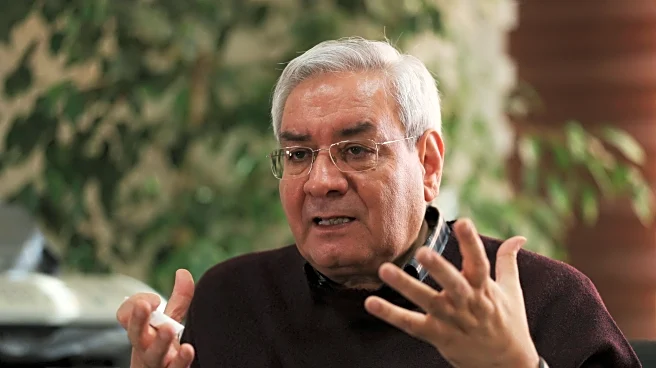What is the story about?
What's Happening?
Israeli defense manufacturers, including IAI, Elbit, and Rafael, showcased their combat-tested systems at the DSEI arms fair in London, despite a government ban on official delegations. The event highlighted Israel's advancements in small surveillance drones, loitering munitions, and tactical air defense systems. UVision unveiled an AI-enabled mission management system for loitering munitions, allowing soldiers to operate multiple airborne munitions simultaneously. Bird Aerosystems introduced a compact directed infrared countermeasure, while Aeronautics displayed cost-effective uncrewed surveillance platforms. These technologies are gaining traction due to their battlefield-proven status, particularly in conflicts like Gaza and Ukraine.
Why It's Important?
The showcase of Israeli defense technology at DSEI underscores the growing demand for advanced military systems that are proven in combat. These technologies are crucial for modern military strategies, emphasizing surveillance, precision strikes, and electronic warfare. The innovations presented by Israeli firms could influence global defense procurement, offering cost-effective solutions for various military needs. The AI-enabled systems and compact countermeasures represent a shift towards smarter, more efficient warfare capabilities, potentially impacting defense policies and military tactics worldwide.
What's Next?
Israeli defense companies are expected to continue expanding their market presence, leveraging their battlefield-proven technologies. UVision plans to deliver its AI-enabled mission management system to customers next year, indicating ongoing interest in advanced munitions. The success at DSEI may lead to increased collaborations and contracts with international partners, further integrating Israeli innovations into global defense strategies. As military doctrines evolve, these technologies could play a pivotal role in shaping future combat operations and defense policies.
Beyond the Headlines
The participation of Israeli firms at DSEI, despite official bans, highlights the complex geopolitical dynamics surrounding arms trade and international relations. The emphasis on AI and compact systems reflects broader trends in military technology, focusing on efficiency and adaptability. These developments raise ethical considerations regarding the use of AI in warfare and the implications of exporting advanced military technologies to various regions. The integration of these systems into global defense frameworks could influence long-term military strategies and international security policies.















